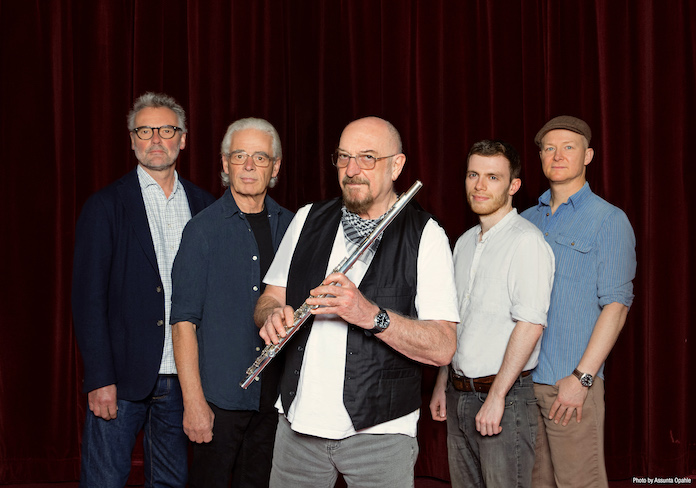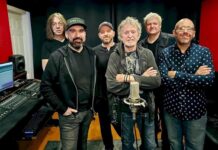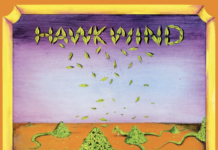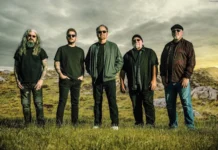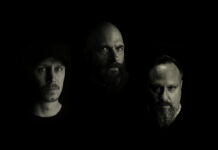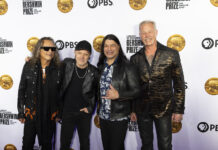With a new album due for release, the second in two years, accompanied by Bruce Soord, Pineapple Thief, Ian Anderson talked about the ideas behind and the recording of Jethro Tull’s 23rd studio album, RokFlote, in the somewhat palatial surroundings of the Dolby Atmos, in Soho Square.
Ian Anderson began by emphasising the release of Rokflote so soon after 2022’s The Zealot Gene did not arise from a burst of creativity on his and the band’s part.
“Zealot Gene was actually begun in 2018 but the pandemic put everything back, so we weren’t able to complete it for a while.” He went on to say there’ll probably be another new release sometime in 2024, though he wouldn’t be drawn on specifics.
“And then, after that, I’ll probably be done,” he said half-jokingly. “I mean, I’m kind of an old guy now, unlike this young man here,” he said, turning towards Bruce, “who’s just celebrated a significant birthday.” Bruce admitted to just having turned 50. “But I’m not going to play golf or go fishing, things I’ve always said I’ll never do.”
A Norse theme was chosen for the new album, he stated, because he saw it as a challenge to take on something he’d previously avoided because of its association with death metal bands and the misappropriation of the umlaut. “If Heinrich Himmler was alive today, he’d probably be listening to these kinds of bands,” he laughed.
Had there been any ideas for songs left over from previous album, The Zealot Gene or any previous albums? None at all, he said. Rokflote started from a blank canvass. “I started New Year’s Day 2022 at 9am.”
He went on to explain how lucky he felt about his creative juices still running. “I get an idea and I go with it, I try and develop it to see what happens. More often than not, it’ll be a title, or a subject, or something which gives me a direction, either musically or lyrically, and then I see what comes into my head, a line of music or maybe a lyric, though in an ideal world, music and lyrics would proceed together.
Any idea can usually be made into a good idea for something but, if it can’t, it’s usually put aside and you’ll never hear it. But the important thing is the ideas are still coming.”
Given the subject matter of the album, were all the songs connected by a theme or was each track a standalone song?
“There is no story,” Ian explained. “I’m not dealing with a consequential series of events, I’m an observational writer. I rarely tell stories as this suggests something which progresses through time, but there’s no narrative here in that context, they’re all descriptive.”
How do Jethro Tull go about recording albums nowadays?
“It tends to be done by demos, which I record at home in a very simple way. I then give the band members all the notes about the arrangements, the sounds and the approach I’ve taken. I try to give them a written precis prior to rehearsal so when we do come to rehearse, they’ve transcribed all the music and they’re ready to play roughly through the songs straight away. Then we spend time on the arrangement to fine-tune things, then probably the next day, we’d go in and record it.”
With this approach being taken, however, do his musicians actually read the lyrics?
“No,” Ian says to general laughter. Ian turns to Bruce and asks if Pineapple Thief musicians read the lyrics ? “No, they don’t either.” More laughter.
“I think the lyrics are important,” says Ian, “especially if I play on someone else’s album, as I like to be able to know what it is I’m playing on.”
Covid interrupted the recording of Zealot Gene, and several of the songs had to be recorded at the individual homes of band members.
“But since lockdown ended, we’ve been able to work together carefully in rehearsals and recording, but we took plenty of precautions because, if any of us caught Covid, we’d be in deep trouble. My responsibility isn’t just to the band, it’s also to the crew and the thousands who buy concert tickets, so I’ve done everything to avoid getting covid so far.”
On previous albums, Steven Wilson had worked on surround sound mixes but Rokflote saw Bruce Soord (Pineapple Thief) in the chair.
“Steven Wilson was busy working on his own album, as well as having commitments to work on some of Jethro Tull’s back catalogue, and Jakko Jakszyk was expecting to do something with King Crimson, plus he had his one-man show at the Edinburgh fringe festival. I came across Bruce through my son James, who knew of Pineapple Thief, so I listened to some of their music and really liked it, so I went to see Bruce. He has a shed at the bottom of his garden, and when you enter, it’s full of amazing technical equipment! He did a couple of test tracks to see how Dolby Atmos sounded and also Sony 360. He’s a good guy and I enjoyed working with him, though I couldn’t work in a garden shed,” he laughed.
Bruce was sitting alongside Ian and he went into some very technical descriptions about recording techniques like ‘separating sounds’ and ‘spatial awareness,’ quite a bit of which flew straight over the head of this writer, but it all sounded very interesting so I just nodded in what I assumed were the right places and hoped nobody was asking questions later.
The tracks ‘Ginnungapap’ and ‘The Navigators‘ have been released as singles. Was Ian pleased with how they’ve been received?
“I don’t read reviews as they don’t interest me, so I don’t know how they’ve been received. I probably stopped reading them 30-40 years ago. My PR used to send me the bad reviews to see what I was up against, which was a sharp reminder you’re not always doing everything right and maybe the reviewer’s making a meaningful point.”
Ian was asked, if he could rerecord one past Jethro Tull album, which would it be and why?
“If I could come across a drummer who could play on 14 different tracks, then it would be Under Wraps (1984) as this was recorded ‘live’ in the studio with a drum machine, and I wasn’t entirely happy with this approach.”
This led to a general discussion about albums which are either being worked on and have been and are due for release soon.
“Broadsword And The Beast (1982) is due to be rereleased in July 2023 after a remix done by Steven Wilson, and he’s also working on a remixing of Bursting Out ( a ‘live’ album from 1978) which’ll be coming out some time into 2024.
Ian moved on to talk about the value of back catalogues.
“Back catalogues are a rich part of our cultural heritage. At one time, labels didn’t bother about them as albums used to sell in large quantities, but nowadays in the age of streaming, when albums no longer sell physical copies in anything like these quantities, they’ve realised there’s value in the back catalogue of a band, thus all the remixes and reissues, etc. We’ve always had a great relationship with any record company we’ve been with, which’s been beneficial to both sides.”
After a lively 45-minute session, the Q&A was completed, Ian and Bruce took their leave, and we were then treated to a complete run-through of Rokflote itself (review elsewhere) and, after having heard a review copy only on download, through the Dolby Atmos system in the viewing room, it sounded amazing, and the sound and production levels were amazing. Both Ian Anderson with the songs and music, and Bruce Soord with his production, can feel proud of their work. The album itself will be released on April 21st and will be available in a wide range of formats, including a “limited edition 2LP (dark red vinyl) + 2CD + Blu ray artbook,” with the Blu-ray featuring Dolby Atmos 5.1 surround sound and alternate stereo mixes by Bruce Soord .. as well as a “limited edition deluxe 2CD + Blu ray artbook” and a “special edition CD digipack.”
This was a very informative evening, with Ian Anderson once again proving, along with Pete Townsend and Roger Waters, he’s one of the more erudite prog rock musicians of his generation with his knowledge and insights into the music.

